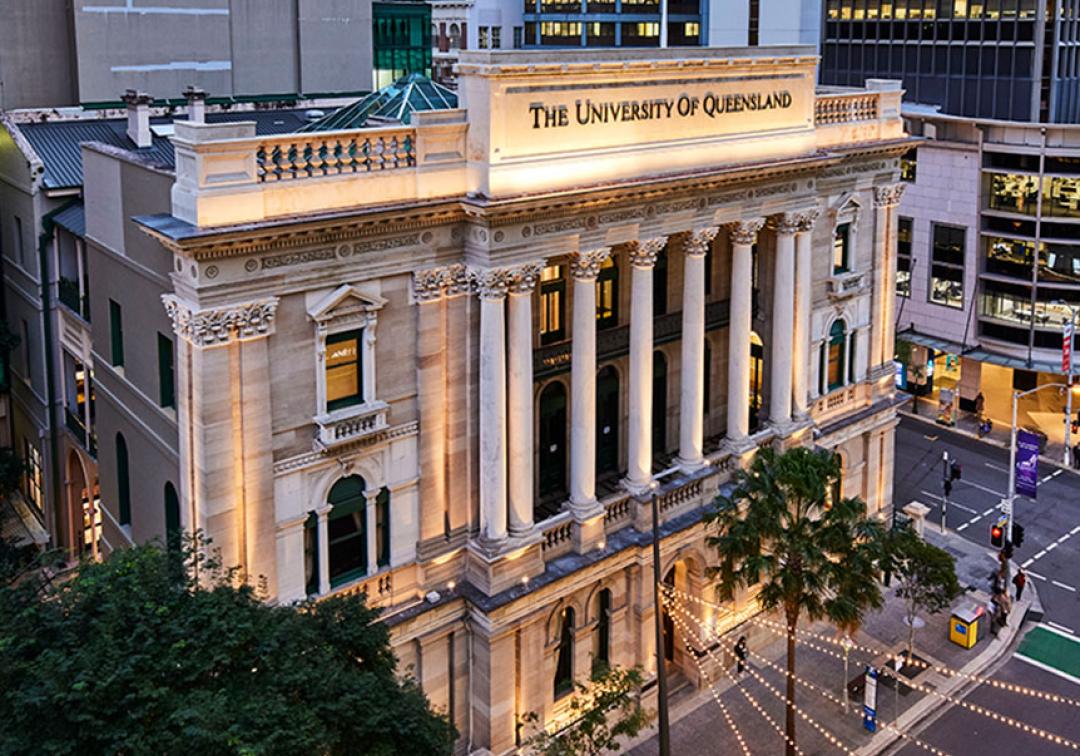
Bachelor of Design
Overview
Good design is essential. It starts with identifying a problem and ends with an outcome, driven by the desire to meet the needs of the user.
UQ’s Bachelor of Design will empower you to create transformative solutions for a more sustainable future. Through hands-on, studio-based projects, you'll collaborate with peers, question assumptions, and prototype new ideas that address complex problems in imaginative ways.
This multidisciplinary program incorporates elements of business, IT, architecture and the humanities. You'll develop a flexible range of skills to succeed in almost any industry – from digital communication or industrial design to spatial and human-centred design.
You’ll graduate with the creativity and expertise to drive meaningful change and make an impact in the world.
You can specialise in 1 or 2 majors that align with your preferred career pathway. Choose from Anthropology, Buildings and Environment, Environment and Society, Information Environments, Innovation and Entrepreneurship, and Media and Digital Cultures.
Join a new breed of designers who possess the expertise and creativity to respond to the complex needs of a contemporary world.
Program highlights
- Discover how you can design creative solutions for people and a better world.
- Learn the core principles of design across 6 hands-on design studio-based projects.
- With 6 diverse majors to choose from, you can deep dive into your area of interest.
Majors
Tailor your studies to suit your goals. This program offers these options:
- Anthropology
- Buildings and Environments
- Environment and Society
- Information Environments
How you'll learn
Your learning experiences are designed to best suit the learning outcomes of the courses you choose.
- Lectures
- Tutorials
- Fieldwork
- Studios
What you'll study
At UQ, degrees are called 'programs' and subjects are called 'courses'. Here's a sample of the courses you could study in this program:
- Design for a Better World
- Design: Environment
- Design: Interaction
- Design: Experience
Dual programs
Double your skills and your opportunities with a dual degree. You can study the Bachelor of Design as a part of these dual programs:
Career possibilities
Our programs prepare you for your first job and beyond. Depending on which major you choose, here are some of the careers you could be on your way to:
- Business entrepreneur
- Environmental graphic designer
- Wayfinding designer
- Product designer
- Design manager
- Furniture designer
- Change manager
- Magazine editor
Average annual salary range
Product Designer
seek.com.au
Events
See all events
1 May - 22 May
UQ's sustainable energy programs – live Q&A webinars
Stories
See all stories
Careers
Emerging careers in the arts and communication industries
5-minute read

Careers
Highest paying careers in business, finance and economics
6-minute read
Stories
See all stories
Careers
Emerging careers in the arts and communication industries
5-minute read

Careers
Highest paying careers in business, finance and economics
6-minute read
Entry requirements
Prerequisites
Prerequisites
Minimum entry score
Select where you studied and your qualification to see the minimum entry score you need to be considered for this program.
Use the minimum entry score as a guide. Your score must be at least equivalent to the required Australian Year 12 ATAR score. Entry requirements are subject to change.
Entry score threshold
| ATAR / Rank | IB |
|---|---|
| 84 | 32 |
These are the lowest adjusted scores we made an offer to in Semester 1, 2025. Entry scores are based on the most recent Semester 1 intake and are updated in April each year. Meeting the entry score threshold doesn't guarantee admission.
Guarantee your place at UQ: If you meet our guaranteed minimum ATAR you could secure an offer for your preferred program.
English language requirements
IELTS overall 6.5; reading 6; writing 6; speaking 6; listening 6. For other English Language Proficiency Tests and Scores approved for UQ
TOEFL iBT (including Paper Edition) - Overall 87, listening 19, reading 19, writing 21 and speaking 19.
PTE Academic - Overall Score of 64 and 60 in all sub bands.
BE - A minimum overall grade of 4 plus a minimum grade of C in all macro skills.
CES - Overall 176 and 169 in all sub bands.
OET is not accepted.
There are other ways to meet the English language requirements. For some programs, additional conditions apply.
Student visas
International students who are accepted into full-time study in the Bachelor of Design are eligible to apply for an Australian student visa (subclass 500).
There are a number of requirements you must satisfy before a visa is granted, including the Genuine Student (GS) requirement.
Entry score range
This table shows the range of entry scores for recent secondary students offered a place in the Bachelor of Design for Semester 1, 2025
| Without adjustments | With adjustments | |
|---|---|---|
| Highest | 97.65 | 99.65 |
| Median | 88 | 90 |
| Lowest | 83.25 | 84.8 |
Need help meeting the entry requirements?
Majors
Majors
Tailor your studies to suit your goals. This program offers these options:
Good design requires us to think about how people will engage with and relate to the envisioned product, service or practice. This major will provide you with the skills and methods necessary to understand the people you're designing for, and to draw on this research to develop design ideas that fit our future needs.
Design anthropologists typically find work wherever a human interface or an understanding of human needs is required. You'll develop skills that transfer across industries and may find work in large engineering or architecture companies or apply your anthropological skills in policymaking or development applications across a broad range of industries.
You will explore both building and planning including sustainability and conservation, transport and infrastructure, architecture and built environment, and the economic and social aspects of development.
You will also explore how human-led processes and design outcomes shape our ability to respond to pressing environmental problems, including climate change, bushfires, food insecurity, waste and biodiversity loss.
Drawing from many disciplines, including sociology, anthropology, planning, philosophy and economics, this major covers global issues including social and environmental injustice, environmental racism and violence, the politics of conflict, and activism and social change.
With broad applications across many career paths, including the diverse field of design, you’ll be prepared to address the environmental challenges of the future. This major will be particularly relevant if you want to address environmental and social challenges through government policymaking, environmental communication and advocacy, and international development.
You’ll explore the design and construction of the technologies and systems that society depends on for crucial functions such as commerce, entertainment and communications, and develop a deeper understanding of the interconnected systems and devices that make worldwide communication possible.
You'll first be introduced to basic principles of innovation and entrepreneurship, including the entrepreneurial mindset and process. Then you'll apply this knowledge in practical courses on digital innovation, social entrepreneurship and growth strategies, as well as technology and innovation management.
Through leadership development, you'll become a resourceful, creative and resilient innovation leader who delivers sustainable commercial and social value. Further extending your skill set, you’ll engage directly in a short placement or consulting project in a startup or commercial partner project.
You’ll also have the option to develop and grow your own business in an incubator or accelerator within the UQ entrepreneurship ecosystem or beyond. These deep immersion experiences will move you closer to commercially viable business solutions while establishing valuable networks with potential partners, investors, entrepreneurs and mentors.
Career paths include starting your own for-profit or social venture as an entrepreneur, driving innovation within established organisations as a business manager or innovation leader, and supporting other businesses to manage and commercialise innovation as a consultant.
You'll engage with course components that examine culture as art, popular culture, social media and the cultural diversity of digital media in Australia and across the world.
This major is particularly suitable for students pursuing professional ambitions in the digital media industries and user-centred digital design.
Majors
Tailor your studies to suit your goals. This program offers these options:
Good design requires us to think about how people will engage with and relate to the envisioned product, service or practice. This major will provide you with the skills and methods necessary to understand the people you're designing for, and to draw on this research to develop design ideas that fit our future needs.
Design anthropologists typically find work wherever a human interface or an understanding of human needs is required. You'll develop skills that transfer across industries and may find work in large engineering or architecture companies or apply your anthropological skills in policymaking or development applications across a broad range of industries.
You will explore both building and planning including sustainability and conservation, transport and infrastructure, architecture and built environment, and the economic and social aspects of development.
You will also explore how human-led processes and design outcomes shape our ability to respond to pressing environmental problems, including climate change, bushfires, food insecurity, waste and biodiversity loss.
Drawing from many disciplines, including sociology, anthropology, planning, philosophy and economics, this major covers global issues including social and environmental injustice, environmental racism and violence, the politics of conflict, and activism and social change.
With broad applications across many career paths, including the diverse field of design, you’ll be prepared to address the environmental challenges of the future. This major will be particularly relevant if you want to address environmental and social challenges through government policymaking, environmental communication and advocacy, and international development.
You’ll explore the design and construction of the technologies and systems that society depends on for crucial functions such as commerce, entertainment and communications, and develop a deeper understanding of the interconnected systems and devices that make worldwide communication possible.
You'll first be introduced to basic principles of innovation and entrepreneurship, including the entrepreneurial mindset and process. Then you'll apply this knowledge in practical courses on digital innovation, social entrepreneurship and growth strategies, as well as technology and innovation management.
Through leadership development, you'll become a resourceful, creative and resilient innovation leader who delivers sustainable commercial and social value. Further extending your skill set, you’ll engage directly in a short placement or consulting project in a startup or commercial partner project.
You’ll also have the option to develop and grow your own business in an incubator or accelerator within the UQ entrepreneurship ecosystem or beyond. These deep immersion experiences will move you closer to commercially viable business solutions while establishing valuable networks with potential partners, investors, entrepreneurs and mentors.
Career paths include starting your own for-profit or social venture as an entrepreneur, driving innovation within established organisations as a business manager or innovation leader, and supporting other businesses to manage and commercialise innovation as a consultant.
You'll engage with course components that examine culture as art, popular culture, social media and the cultural diversity of digital media in Australia and across the world.
This major is particularly suitable for students pursuing professional ambitions in the digital media industries and user-centred digital design.
Fees and Scholarships
Indicative annual fee
Approximate yearly cost of tuition (16 units). Your fees will vary according to your selected courses and study load. Fees are reviewed each year and may increase.
$11,554
2025
$11,554
2025
Approximate yearly cost of tuition (16 units). Your fees will vary according to your study load. Fees are reviewed each year and may increase.
AUD $47,200
2025
AUD $47,200
2025
Government assistance
Financial aid
As an international student, you might be eligible for financial aid – either from your home country, or from the Australian Government.
HECS-HELP
Domestic places in the Bachelor of Design are Commonwealth supported. This means the cost of your education is shared between you and the Australian Government.
Instead of tuition fees, Commonwealth supported students pay what are called student contribution amounts.
HECS-HELP is an Australian Government loan scheme to assist eligible students with the cost of their student contribution amounts.
Centrelink support
The Australian Government offers a number of income-support payments to eligible Australian university students.
Scholarships
You may be eligible for more than 100 scholarships, including:
...Loading
How to apply
Applying online
If your senior schooling is from outside Australia, you can submit your application to UQ. Or, if you prefer, you can use an approved UQ agent in your country.
The program code for the Bachelor of Design is 2454.
Find out more about applying for undergraduate study
If your senior schooling is from Australia
Submit your application to the Queensland Tertiary Admissions Centre if you're an international student who is currently studying:
- Australian Year 12 (in Australia or another country), or
- the International Baccalaureate in Australia.
The QTAC code for the Bachelor of Design is 711203.
Applying through QTAC
All domestic applications should be submitted to the Queensland Tertiary Admissions Centre (QTAC).
The QTAC code for the Bachelor of Design is 711203.
Important dates
If you’re studying Year 12 in Australia, go to the QTAC website to check the closing date for this program.
If you’re applying to UQ, the closing date for this program is:
- To commence study in semester 2 - May 31 of the year of commencement.
- To commence study in semester 1 - November 30 of the previous year.
Visa processing times vary. Apply as early as you can.
To learn more about UQ dates, including semester start dates, view the Academic Calendar.
Important dates
To check the closing date for this program, go to the QTAC website.
To learn more about UQ dates, including semester start dates, view the Academic Calendar.
Admissions schemes
Applying to university can be both exciting and daunting, which is why we’ve tried to make the process as simple as we can.
We have several schemes in place to improve your chances of getting a place at UQ.
Pathway options
A rank or score doesn’t determine your potential.
If you're not offered a place in your first-choice program – or if you don't meet the entry requirements – you still have a number of options.
Aboriginal and Torres Strait Islander applicants
For support with applying – or if you have any questions about university life – get in touch with our Aboriginal and Torres Strait Islander Studies Unit.
Explore other programs
Express yourself. And your interest.
They say choosing a degree is hard, which is why we've made it easy. Register your interest and we'll send you everything you need to know about applying to UQ.




